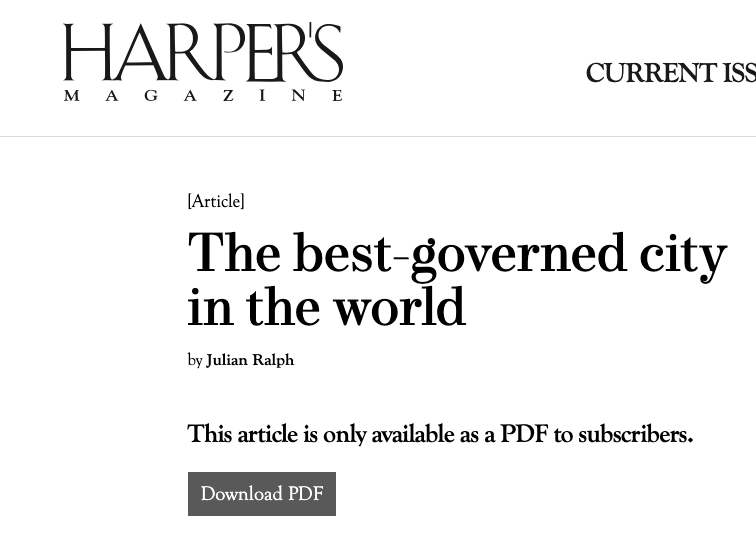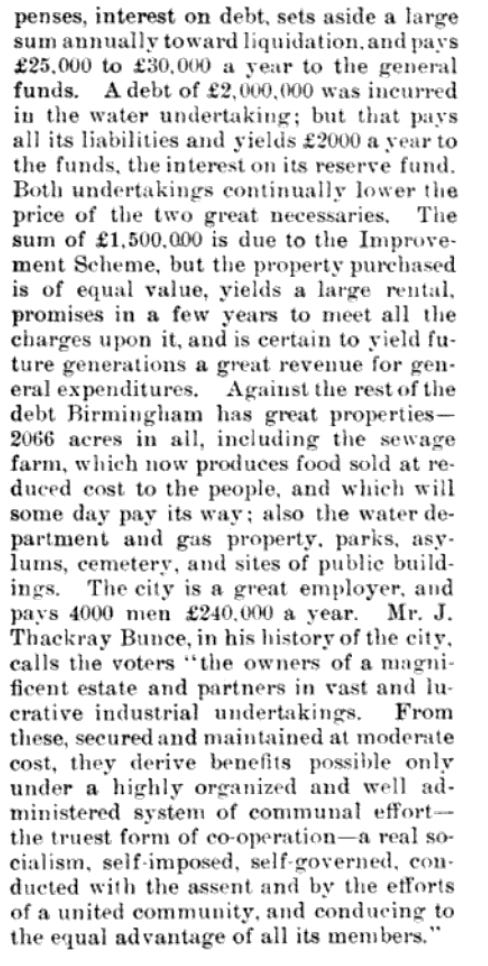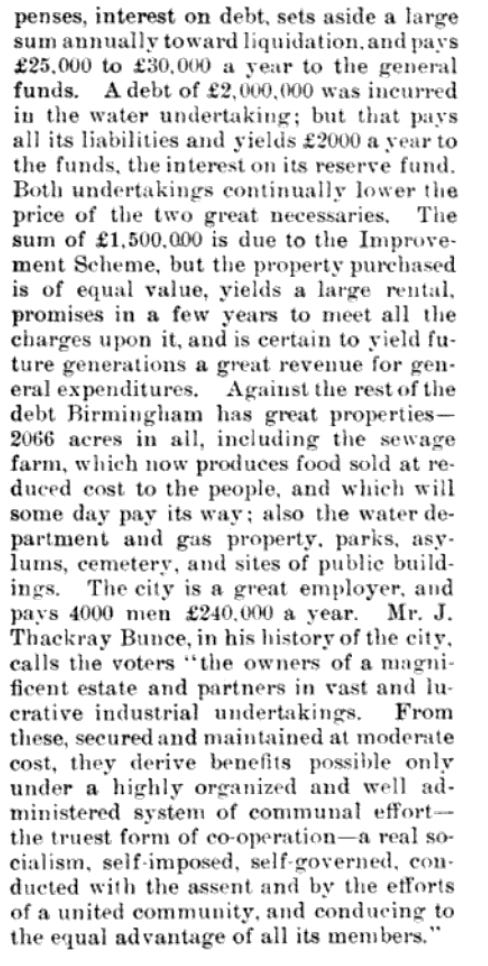Whatever happened to ‘the best-governed city in the world’?
Some footnotes to the article at Prospect on the Birmingham city insolvency
Over at Prospect magazine I have written an article headlined Whatever happened to ‘the best-governed city in the world’?.
Please do click and read it.
The rest of this post below provides some footnotes to the article and further thoughts about the subject.
*
The title of the article, of course, derives in part from the Alan Moore comic.
*
The other part of the title, however, is derived from one of the various quotations and sayings that you come across if you happen to come from or live in Birmingham. Others are “city of a thousand trades” and “more canals than Venice”.
But “the best-governed city in the world” seemed a good starting-point for this piece.
I knew it was from an American journalist about late Victorian Birmingham, but off-the-top-of-my-head I did not know more than that.
So I thought it may be interesting to track down the original quotation: any further information and context may at least add colour to a piece about local government finance and public procurement, which are not easy things to write about in an accessible way.
*
Pretty soon I got a year for the article which had the quotation - 1890 - the name of the journalist - Julian Ralph - and the name of the magazine - Harper’s.
Finding it was Harper’s magazine was amusing for this is the glossy magazine still published today:
And indeed the 1890 article about Birmingham municipal glory is still available on Harper’s website, but only to subscribers:
I am not, however, a subscriber to Harper’s - and it seemed disproportionate to take out a subscription just to obtain the piece, as I suspected there would not be many other articles about Birmingham.
So I wondered if the article was available elsewhere.
(The issue of copyright then crossed my mind, but it seemed to me that an 1890 article by a writer who died in 1903 was likely to be in the public domain.)
*
And eventually - Bingo! - I found an online copy of the publication:
And there on the contents page was the article and it actually had the quote as its title:
(Isn’t the Birmingham - see “Best-Governed City,” etc a lovely detail.)
For some reason I expected it to be a short piece, but the actual article was some twelve pages long with double columns.
So I started reading:
And on the last page of the article, and in the last paragraph, was this discussion of debt and the treatment of workers (which you should read so as to make sense of the rest of this post):
Any researcher will tell you of those moments when they are visited by the goddess Serendipity.
Not only had I found some colour for my Prospect piece, I had actually found a detailed point of comparison and contrast for a piece about Birmingham’s current predicament.
And, significantly, the 1890 article about “the best-governed city in the world” averred that the city council prowess was not because it avoided debt - indeed, the city council embraced immense debt, at levels almost unimaginable at current prices.
It was about how those Victorian councillors managed and resourced that debt, as serious people of business engaged in grand projects.
More of the Prospect piece then clicked in to place.
*
Switching to the here-and-now, a close reading of the “section 114 notice”, the legislation, the relevant legal cases (for example this Supreme Court decision) and the detailed reportage at the Register and elsewhere, meant that various knee-jerk things to blame dissolved.
Labour! Conservative! - well, the key employment claim was commenced when the council was under a Conservative-led coalition, and then a Labour majority. And IT project disasters care little for party affiliation.
Resources! tax! - the IT project disaster looks as if it would have also swallowed double the budget. More public money would have just gone straight through to the contractors and consultants.
(Money In, Money Out is as much a feature of bad IT procurement as Garbage in, Garbage Out.)
The problem with both the matters that have brought down Birmingham is governance.
The employment case was litigated and litigated, but the ongoing exposure appears not to have been properly managed. And sometimes litigants lose.
The IT procurement ended up as an exercise in constant changes to the software to match working practices, rather than the reverse. And any public sector procurement of bespoke developed software, as opposed to commercial-off-the-shelf software, will always tend to go badly.
The problem was glaring: neither exercise in managing risk and exposure was sensibly managed.
Compare and contrast this with the various endeavours mentioned in the 1890 article: the acquisition of gas and water undertakings, and the improvement scheme that changed the face of a Victorian city. These were also enterprises which could have gone wrong, very wrong.
But read again that last paragraph from Julian Ralph:
You will see the seriousness in how the risks and exposures are managed.
*
Of course, the Victorian councillors were deft self-publicists - and the leading Birmingham politician of the age, Joseph Chamberlain, can only be matched by Benjamin Disraeli in how his public image was manufactured and exploited.
Joseph Chamberlain even oversaw a memorial put up to himself, while he was still a relatively young politician and businessman.
And the 1890 article was the glossy magazine puff-piece of its time.
But.
Even realising the talent for rampant self-publicity of the Victorian politicians, the acquisition of the gas and water undertakings, and the slum clearances redevelopment, were considerable achievements for what was a growing and unfashionable urban sprawl.
(Indeed, until the year before the 1890 article, Birmingham was not even technically a city - the charter dates only from 1889.)
Whatever the (sometimes understated) faults of the municipal corporations of the time, local government was taken seriously - by voters, by the councillors, by the polity generally. Corporations had great powers, and they often used those powers sensibly, if ambitiously.
*
A close look at current day problems of Birmingham city council also points to it not really being just about Birmingham at all.
Unequal pay will have been a problem for many councils, and poor IT procurement does not only have a Brummie accent.
The predicament of Birmingham is that two major exposures came together at once.
(Though, as the city has long been a centre for transport routes, from the canals to Spaghetti Junction, being the venue for such a confluence does seem apt.)
Many councils are probably a few steps away from a section 114 notice - under all political parties and none. Birmingham, which we are often told is the largest local authority in Europe, is just a striking illustration of a wider problem.
In part, the problems is about resources and ideology - and under-resourced councils and ideological commitments will often make things worse.
But section 114 notices - the emergency brake of local government finance - are also perhaps a function of poor management over time.
The overall problem is perhaps a lack of seriousness: in how we as a polity now treat local government, in how central government and parliament treats local government, and in how councils themselves manage risk and exposure.
*
Finally, a shout-out to Prospect to being able to use this glorious 1886 depiction of Birmingham as the picture for the piece - complete with the Chamberlain monument in the foreground:
This print was up on the wall of an office in which I once worked as a temp and staring it probably was the start of my fascination with the (actual) history of my own city.
And if you look carefully at this 1886 print, you will see the dirty industrial smoke is blowing away from the nice civic architecture. As said above: the Victorians were deft self-publicists.
But if they took themselves too seriously, they also took local government seriously. And the latter is the lesson they give to us today.














“The ultimate problem is perhaps the lack of seriousness with which local authorities are regarded and the lack of seriousness with which councils are run. […] Councils are expected to do a great deal, but with fewer resources and almost no real autonomy”
This is the crux of the problem - local government in the UK is a joke, an afterthought, somewhere central government can dump responsibilities without having to hand over the powers or the finance to deal with them. It was also the perfect victim of the coalition government’s savage attitude towards public debt and deficit, as most people don’t understand what LAs do despite them having more impact on their daily lives than anything Westminster does. Just cut their funding and let them fend for themselves, they said. Well, the chickens are finally coming home to roost...
Fascinating. I do think that there’s another, specifically Birmingham, issue that contributed to a lack of self-confidence in the city as compared with, say, Manchester (a city with a longish recent period of sensible but ambitious one-party dominance). By the late 1960s Birmingham was growing strongly, and with a varied local economy. Wages and property prices matched, or exceeded, London’s. It was a major centre of media, with both BBC and ATV centres there producing some of the highest rated programmes at the time. But a decision was taken to prevent what would have been normal in most countries - the emergence of a city with the size and economic base to rival the capital. A long period of disinvestment followed, some that would have happened anyway, some deliberate (I think that there was a ban on companies have HQs in the city, a stop to new commercial property other than retail in the city centre, and more. The recent building frenzy, the location of HSBC’s British retail banking HQ in the city, etc. would have happened 50 years ago if it had been permitted. All of which “might have been” stuff explains the city’s shrinking revenue from business taxes over decades.